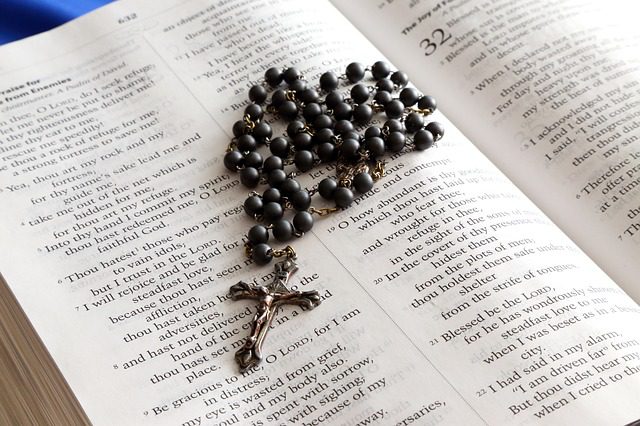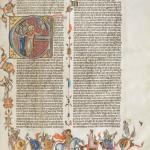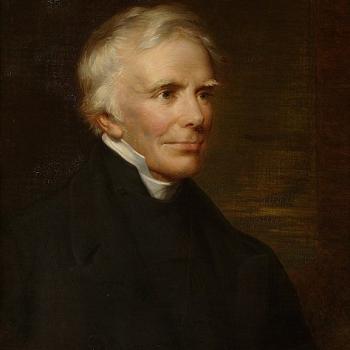
My article, “Catholics Need to Read Their Bibles” was published in This Rock (now Catholic Answers Magazine) on 1 February 2004. See also my original, longer version from 6-26-02. The Catholic Answers site has published a letter about this article from one Ann Roth. Here it is in its entirety:
Scolding and Uncharitable Comments
I agree with Dave Armstrong’s basic premise that Catholics should read the Bible more because it will bring them closer to God, and a better familiarity with Scripture will help them witness better to our Protestant brethren (“Catholics Need to Read Their Bibles,” February 2004). But if Armstrong’s goal was to encourage Catholics to read Scripture more, he failed because of scolding and uncharitable comments and incorrect analysis and conclusions.
Were comments like “kindergarten Christianity laziness” and “content to let Mother Church spoon feed them” supposed to encourage one to read Scripture? Was questioning a Catholic’s love of God and faithfulness really necessary? As I read these words I thought of my seventy-five-year-old mother and elderly aunts and uncles who do not make a practice of reading Scripture but understand the teachings of Christ and the Church (from Scripture) better than most. They live lives of love, faith, and charity. How dare anyone judge their love of God based on whether they make a regular practice of reading the Bible. And before Mr. Armstrong knocks prayer books and rosaries, maybe he should look one over, as they are based on Scripture and quote a great deal from it. I got the impression that he was rather dismissive of the impact of reading and meditating on Scripture in this way.
While official Church documents may encourage the study of Scripture, there is very little encouragement on the local parish level. Most parishes do not offer Bible studies, and most Catholics are not going to undertake Bible study on their own. It is too daunting a task. We would rather approach it through the rosary or a prayer book or a commentary to make it come alive and help us to experience the full meaning of the written word. Bad catechesis is a factor that needs to be corrected and faith renewed before a Catholic will undertake Bible study.
I am happy to say that I started attending a Bible study prior to reading this article. If I had read the article first it might have delayed my getting started. For years I hesitated over Bible study because of my experiences with Bible-quoting Protestants who “talked the talk” but didn’t “walk the walk” because in the very act of quoting Scripture they exhibited uncharitable judgments on anyone who disagreed with them. I was drawn to this particular Bible study by people who live and love as Christians but don’t quote the Bible every chance they get.
As a cradle Catholic, I have been blessed to experience the fullness of the faith through many different sources, and I am happy to say that Bible study is now one of them. Each person’s faith journey is different both in terms of stops along the way and how long it takes. Please be more charitable with others along the way.
Ann Roth
via the Internet[posted on 3-2-16; 2nd article down]
Note: Catholic Answers decided to delete this page, so it’s no longer on their site, but this woman’s comment would be in one of the print editions of the magazine; therefore, I will respond to it, because it’s way off . . .
Ann concedes that my main thesis is correct, in her first and last paragraphs, so that is not in dispute. Her complaint is about remarks of mine that she finds “scolding and uncharitable.” Being most imperfect, like everyone else I know, I’m always willing to seriously consider constructive criticism, so let’s take a closer look at her analysis.
Words need to be interpreted and understood within an overall context. Yes, I was a bit harsh in places; perhaps too much so, but I think her criticism is unduly harsh. She quotes my harshest criticisms, but entirely out of context. Here is the full context (citing the article itself):
But the “solution” of many Catholics: to not read the Bible at all so as to not be “confused” or “led astray”, is lamentable, “kindergarten Christianity” laziness. The same people who are guilty of this shortcoming usually find plenty of time to devote to the “study” of sports, politics, their latest boyfriend or girlfriend, their lawns and gardens, and so on. Yet somehow they can’t find any time to read their Bibles and soak in the words of the very Lord they worship and receive every week.
Why? This practice is not in accordance with Catholic teaching. Catholics have the Church to guide them, but that doesn’t mean that they should sit and let the Church do everything for them with regard to biblical learning and literacy.
My guess is that many Catholics simply don’t want to do the work. They are content to let Mother Church spoon-feed them. (They want to remain “babes in Christ” who drink “milk,” as Paul says.) That is not Catholicism in essence. Catholics are to work and strive to understand their faith just as much as any Evangelical Protestant does, and that includes Bible reading. The fact that they often don’t do so is an indictment of Catholic catechesis in the last generation, but not of the Church’s teaching itself: because that is not what is taught.
Note that I was specifically referring to those who do “not read the Bible at all”: not to all those Catholics who arguably don’t read the Bible “enough.” That’s what I called “‘kindergarten Christianity’ laziness.” And it certainly is. I make no apology for that. I think it is rather mild.
The spoon-feeding comment comes directly from the thought of St. Paul (1 Corinthians 3:1-2), as I alluded to. But I was thinking more so of the sort of thing expressed by the author of Hebrews:
Hebrews 5:11-14 (RSV) . . . you have become dull of hearing. [12] For though by this time you ought to be teachers, you need some one to teach you again the first principles of God’s word. You need milk, not solid food; [13] for every one who lives on milk is unskilled in the word of righteousness, for he is a child. [14] But solid food is for the mature, for those who have their faculties trained by practice to distinguish good from evil.
I wasn’t advocating mere Bible-reading with no guidance from the Church. After all, I also wrote: “That it is a good thing to read the Bible more is indisputable, and the Catholic Church teaches this. It also teaches that one should submit one’s theology as a whole to the Church and not oppose one’s own theology to that of the apostolic Tradition of the Church.” And later I again referred to the need to “submit to the mind of the Church.”
Ann wrote the following, apparently thinking that I would disagree with it:
While official Church documents may encourage the study of Scripture, there is very little encouragement on the local parish level. . . . Bad catechesis is a factor that needs to be corrected and faith renewed before a Catholic will undertake Bible study.
In fact, I fully agree, since I referred to “an indictment of Catholic catechesis in the last generation” in this regard. She wanted to blame the local parish for its laxity regarding encouragement of Bible-reading; so do I. Ann falls into the fallacies of “either/or” dichotomies: pitting one thing unnecessarily against another. She writes:
Was questioning a Catholic’s love of God and faithfulness really necessary? . . . How dare anyone judge their love of God based on whether they make a regular practice of reading the Bible.
Again, context is crucial to properly understand my point. I wrote:
I hear more Scripture at every Mass: in the readings, the liturgy, and the homily, than I ever did at the various Protestant services I attended for the thirteen years prior to my conversion. But we Catholics need to read our own Bibles as well. If we don’t, then we don’t love God as much as we think, because love demands that we want to know more and more about the one we love, all the time. The Bible is God’s very inspired words. How then can any Christian not be passionately interested in it? . . . [last sentence in my article] Merely reading a Bible doesn’t prove love of God, but a person who truly loves God will long to read the words of his beloved.
This was a relative point, not an absolute one. That’s a crucial difference. Ann acted as though I was questioning anyone’s love for God, if they didn’t regularly read the Bible (like a “good Protestant.”). I’m referring here again to a position of not reading the Bible at all. Then I made the simple point of what this implies. I explained exactly the rationale for my comments. It would be like not talking to one’s spouse or best friend or mother. Of course love demands that we do that. Therefore, if we love God, we want to read His words in His inspired Scripture.
Even so, I didn’t question such people’s love of God altogether, let alone their faithfulness. I merely noted that for a person who never reads Holy Scripture, they must not love God “as much as [they] think.” This is a perfectly reasonable point, and not nearly as sweeping as Ann makes out.
Ann then goes after a supposed antipathy on my part to prayer books and rosaries (see her words above). In context, here is what I wrote:
[I]t is also good to show forth a positive love for Scripture. That comes only by reading it and becoming better acquainted with its contents. If the Mass alone were sufficient for that end, then Catholics would already know their Bibles better than Protestants. But they obviously don’t. So I regard it as a self-evident truth that Catholics need to do more study apart from the liturgy, prayer books, and rosaries. We need to read the Bible itself, frequently and often.
Again, this is seen to be a relative observation, not some absolute. Ann thinks I am pitting the rosary against individual Scripture reading. None of that follows from what I wrote. To observe that praying the rosary or reading prayer books without reading Scripture, is unbalanced, is not to run those things down in the slightest. It’s like criticizing a person for eating only vegetables, and neglecting grains and fruit. That’s not running down vegetables! It’s only saying that it is an incomplete diet.
Ann imagines that I am “dismissive” of the Rosary and unaware that it is Bible-based. Yet for some reason I have managed to post on my blog four defenses of it, including analysis of how biblical it is:
Is the Rosary “Vain Repetition”?
Is the Rosary Christ-Centered?
Questions Regarding Catholic Mariology & the Rosary
Lutheran Pastor Bashes Prayer to Mary & Rosary (“Vain Repetition”)
Nor were these some recent conversion of thought for me. I defended the Rosary in chapters in my books, The Catholic Answer Bible (2002), The One-Minute Apologist (2007), and “The Catholic Mary”: Quite Contrary to the Bible? (2010). The utterly unwarranted charge of a lack of appreciation for the rosary is a mighty strange one to send my way. But it was based on taking my words out of context and creating a false dichotomy that never ever crossed my mind, either in my article or at any time.
Lastly, Ann gave her impression of my article, and it was a negative one (even though she actually agreed with my main points and now attends Bible studies herself). But Catholic Answers also posted a positive review from another woman on the same date (3-2-16; scroll down a ways). Here it is:
Our Rich Heritage
Just wanted to compliment you on the article “Catholics Need to Read Their Bibles” by Dave Armstrong (February 2004). For years I’ve had Protestant friends who have asked me, “Why doesn’t your Church emphasize the Bible more?” I have recently begun reading it more myself. I think that there is a lot to learn in the Bible, especially when we want to defend our faith and Church or we want to know where a teaching comes from. I’m really happy about the extra emphasis the Church is placing on the Bible without compromising the other traditions of our faith. I don’t think writing about paying more attention to the Bible is “upholding Protestants as examples” so much as it is reminding us of our rich heritage that comes from the Bible and how we need to remember that.
Maria Yaworsky
Washington, D.C.
As I always say about apologetics, and my own efforts at same, “win a few, lose a few.” But I think the criticism I have addressed is a case study (almost a classic one) of taking words out of context, and selective quotation. She got out of my words almost the very opposite of their true meaning and intent (as shown, precisely by surrounding context). I can never emphasize enough, the supreme importance of considering context: both in general, and in reading the Bible itself.
***
(5-20-17)
Photo credit: jclk8888 (7-7-13) [Pixabay / CC0 Creative Commons license]
***













